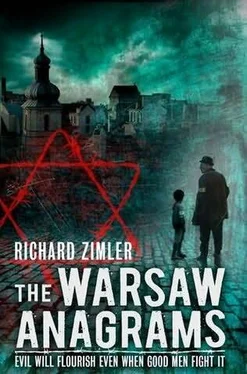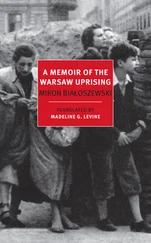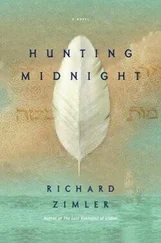‘She told me I was going to take a long trip soon,’ the shorter of the two said.
‘Somewhere warm?’ his partner asked hopefully. He wore black spectacles held together by tape; they kept slipping to the end of his nose.
Leaving their cart on the sidewalk, they gazed around, exchanged a few words I didn’t catch, then shuffled over to a wooden stall set up in front of a clothing shop. Inside was a walnut-faced ironmonger sitting on a three-legged stool, surrounded by piles of door handles, keys and rusted junk. On the walls he’d hung hand-sized wire animals – dogs, cats and swans. A naked woman was slumped at his feet, her face angled down and chin pressed against her chest, but he didn’t seem to see her; he concentrated on the wire he was twisting into the shape of a poodle standing on its hind legs.
The woman’s hands – with red, swollen knuckles – were joined together as if she were still holding a beggar’s cup. The spectacled collector spoke to the ironmonger in a whisper. Then, leaning down, he shook the woman, and her head – gaunt and waxy – flopped to the side. He grabbed her ankles. His partner took her arms.
‘ Eins, zwei, drei ,’ they said in unison.
They lifted her up. Her hips jutted out from around her sunken triangle of sex like shovels.
The ironmonger never looked up to watch her go, but his hands stopped twisting his wire for a few seconds and he closed his eyes.
People go on with their lives the only way they know how. Hannah once told me that and I thought she was being glib, but living in the ghetto convinced me she was right.
As they carried the woman to their cart, the body collectors folded her together, then pulled her apart. Carelessness or a morbid comedy routine?
When they passed, her grey eyes stared at me. I imagined that she wanted to tell me about her life.
If you could say only one thing to me what would it be? I asked her in my mind.
‘I died of thirst for so many things,’ came her reply. Her voice was shadowed by bitterness and regret.
The dead want us to know what killed them, I reasoned – though maybe I only came to that conclusion because it meant that Adam would want me to learn the identity of his murderer.
‘No, she said it would be cold where I was going,’ the short collector told his partner, resuming their previous conversation.
‘She must have meant you’d be heading off to Mogiła Street!’ his partner replied with a quick laugh, since Mogiła meant tomb in Polish.
They dumped the woman atop the dead man they’d previously collected. The bones of her back – jutting fins – crushed his face, and her head dangled back and to the side, threatening to fall off her spindly neck. Her breasts, shrunken, sucked dry by hunger, were wrinkled pancakes pressed against her ribcage.
No one rushed to cover her. Or to claim her.
Janek’s mother invited me in when I explained my visit. She said I looked faint and brought me a glass of water right away.
The studious-looking, wiry-haired young man was uncomfortable discussing Anna with me, but after I told him I suspected that she had been gravely ill, he confessed he’d had a quarrel with her over twenty złoty she’d borrowed from him and couldn’t pay back. They hadn’t spoken since early January.
‘Listen, son, why did Anna need the money?’ I asked.
‘She wouldn’t tell me,’ he replied, which made his mother smack the back of his head. ‘I swear, Mama!’ pleaded the boy, ducking away from her. ‘You know how secretive Anna could be. All she told me was that she was in bad trouble.’
Anna’s other close friend, Henia, lived on Pan´ska Street, near the Noźyków Synagogue, where my mother and I had attended services on high holy days. She answered my knocks dressed for school, in a pretty burgundy jumper and dark woollen trousers. Her cheerful face was framed by blonde braids, which made her look as though she’d stepped out of a Bavarian children’s story. In her hand was a half-eaten hard-boiled egg.
Her mother called out to ask who was at the door.
‘A friend!’ the girl shouted back. To me she mouthed, ‘Wait downstairs.’
She came rushing into the hallway a few minutes later. ‘I’m late,’ she said. ‘Let’s talk as we walk.’ She buttoned her coat and put on a black leather aviator’s hat with sheepskin earflaps, tucking her braids underneath. She looked like a teenage boy.
‘I have to cross over to the Big Ghetto to get to school,’ she explained, ‘and the German guards used to grope themselves when I passed the gate. A big ugly one even tried to kiss me once. Now, they leave me alone.’
She burst out through the door as if to take on the Nazis and the rest of the world, holding her book bag tightly against her chest – undoubtedly to hide the sleek rise of her breasts.
I liked Henia immediately. And do you know why, Heniek? Because survival was shining in her light brown eyes. I blessed her for that.
‘Do you know what was wrong with Anna?’ I asked her.
‘Wrong?’
‘I have reason to believe she was ill.’
‘She wasn’t ill – the idiot got herself pregnant.’
‘That’s impossible. A doctor who examined her told me she wasn’t.’
‘Then he lied to you.’
‘Why would he do that?’ I demanded.
‘Why wouldn’t he?’ she said, irritated. ‘What right do you have to know intimate details about Anna’s life?’
I remembered Mikael begging me not to force him to lie. ‘But her mother said she had gotten dangerously thin,’ I told Henia.
‘Yeah,’ the girl replied, ‘that was quite a feat, wasn’t it? She had everybody fooled.’
I stopped. Henia didn’t. ‘So you’re certain she was pregnant?’ I called after her.
She turned round. ‘Yup,’ she replied casually, walking backwards. ‘Three months along. If you looked really closely, you could kind of tell in the curve right here, even though she wasn’t much more than a skeleton.’ She designed a contour in front of her belly with her hand.
I caught up, then grabbed the strap of her book bag to keep her from rushing ahead. ‘Did her parents know?’
‘No. Anna didn’t trust them. She wanted an abortion. But we didn’t know where to go. We were afraid that if we asked her doctor or any other adult, it would get back to her parents. So she just stopped eating.’
‘But sooner or later, her condition would have become obvious.’
‘I’m sorry, Mr Honec, but we have to keep walking – if I’m late for school, the director won’t let me in.’
I let go of her strap. Henia shifted her book bag to her other shoulder and we started off again. ‘Anna read somewhere that starvation can cause a miscarriage,’ she told me. ‘So she could hide her pregnancy and get rid of it at the same time. It was a neat trick – if you don’t mind starving to death, that is.’
‘So did she lose the baby?’
‘No. Though we didn’t talk for a couple of days before she was killed, so I suppose she might have lost it then – or even found someone to give her an abortion.’
‘Do you know if she intended to tell Paweł’s mother?’
‘I’ve no idea.’
‘And did Paweł ever give her a ring or a bracelet – something valuable?’
Henia shrugged. ‘If he did, she never showed it to me.’
‘Is it possible that Anna got his name tattooed on her hand? Or maybe his initials?’
Henia burst out laughing. ‘Do you think she wanted to look like a sailor, Mr Honec?’
We were crossing the scruffy park in Grzybowski Square, steering around the low-hanging branches of a hazel tree stripped naked by winter. Henia’s expression turned troubled. ‘There’s something that’s been bothering me,’ she said hesitantly. ‘But I don’t know if I should tell you. Anna wouldn’t like it.’
Читать дальше












